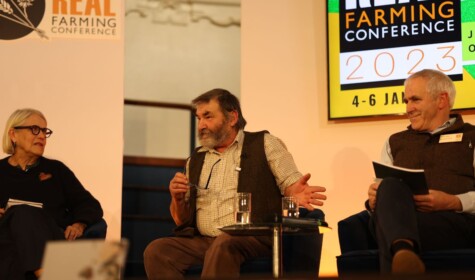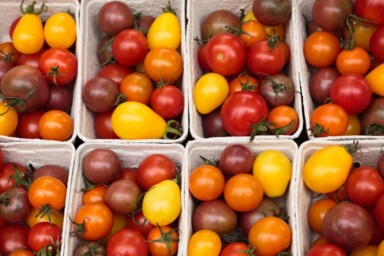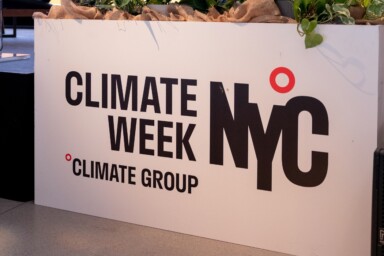The hustle and bustle of the Oxford Real Farming Conference (ORFC) in the Oxford Town Hall was a treat to return to after two years of online conferencing. Cancelling the live conference last year at the last minute had been a wise decision to make with COVID-19 on the rise again, but the disappointment had been palpable. This year, however, it felt the pandemic was well and truly over, even if we all knew that COVID (and a raft of other viruses) was no doubt, still lingering.
The ORFC was as diverse as ever and while it could benefit from a bit more cohesion and perhaps less overlap, it certainly has something for everyone. Inevitably, there is frustration at not being able to see all the sessions you want, but everything is available online post-Conference.
The continued inclusion of the online sessions at the Conference has turned out to be a great development, and it is a component that is likely to stay. Numbers attending in person continue to grow and even as the number of venues expand, it still appears to be approaching capacity. So, attending online saves both time, travel and money and you can also watch certain live sessions taking place at the Conference in real time.
One of the first sessions of the Conference was a hard look at the ‘State of the Four Nations’ – as a starting point, it was anything but uplifting. James Woodward of Sustain tried hard to make an upbeat case for agricultural reform, arguing that England was moving quicker than the other nations in its commitment to ‘public money for public good’. That may be so, but the litany of failures Woodward went on to recount, painted a less than hopeful picture for the future resilience of food and farming in England. There is lack of vision and ambition for sustainable farming, coming from Government. Four million children live in food insecurity in the UK and yet, there is no plan or policy to improve this. The UK / Australia trade deal is undermining the food system and impacting UK food production and the Government is pretty much uninterested in doing anything about it.
In contrast, both Scotland and Wales appeared to have more engaged legislatures, while still moving slowly towards meaningful change in a variety of ways. Pete Ritchie, Nourish Scotland and one of the architects of Scotland’s Good Food Nation Bill, pointed out that the country is not yet a ‘Good Food Nation’; but there is a framework at least that will force the Scottish Government to move forward with the bill. And agriculture reform in Scotland may be behind, but what is being developed is looking quite forward – a focus on land sharing rather than land sparing, incentivising the move to more sustainable farming practices and an emphasis on systemic change.
Wales is buoyed by the Well-being of Future Generations Act, but Katie Palmer of Food Sense Wales pointed out that there is no clear link to food production in it, which leaves it somewhat stranded. However, there are some very good things happening in Wales: a coalition of organisations is now involved in putting a bill through the Senedd to focus farming practice on sustainable food production, which if realised would transform the countryside; Government has an obesity strategy; and universal primary free school meals for all children is being rolled out, with a focus on local supply chains.
In contrast to the ‘State of the Four Nations’, was a session on the UK Climate Change Committee’s research into the potential of agroecological practices in helping to mitigate GHG emissions and improve soil carbon stocks. Lord Deben, who is the chair of the UK CCC, discussed the need to take a holistic approach to tackling the climate and nature crises, and he further spoke about the importance of recognising food production as a public good, arguing also that this is essential in agricultural policy. While these were excellent points, they sadly don’t reflect the CCC’s recommendations for future land use, which are largely focused on carbon alone and promote a ‘sustainable intensification’ approach. What remains difficult about the value of agroecological practices is that they have been little researched in depth and researcher Fabrizio Albanito concluded that new experimental studies are needed into what the impacts and co-benefits of agroecology may be on an environmental, social and economic level.
New topics are also arriving at the Conference as they gain currency in the wider debate and discussion on the future of farming. Sessions such as ‘How can investment and finance decisions be aligned with a transition to agroecology’, ‘Funding regeneration: How unconventional financing models can support food and farming businesses’ and ‘Green investment: Opportunities for nature-friendly farming or the new land grab?’ point to the relevancy of how the financing of farming is opening up in innovative ways but with potentially problematic outcomes, especially in relation to private and corporate interests in carbon credits.
There was a great line-up of notable keynote speakers showcased in the Main Hall – Vandana Shiva discussing her recently published memoir Terra Viva, speaking about growing up in post-partition India and her life in activism; Dave Goulson speaking on the plight of insects and what can be done to turn the tide of the insect apocalypse which appears to be gathering steam and what we can do to ‘rebug’ the planet; Dan Saladino on ‘the foods that could hold the key to our food future’ as he talks about his most recent book Eating to Extinction.
To finish out the Conference was the Sustainable Food Trust’s session Feeding Britain from the ground up: Why we should align our future diets with regenerative farming systems. It was the last session before the final plenary and we are happy to report it was a hit – voted by attendees as the best session of the Conference! With a dynamic line-up of speakers – Darina Allen of Ballymaloe Cookery School, farmer and author Simon Fairlie, SFT CEO Patrick Holden, regenerative farmer Nicola Renison and vegan farmer and grower Ian Tolhurst – there was lots of lively discussion and getting back to the roots of what constitutes healthy eating and sustainable food production. The premise of the session comes from the SFT’s recently published report on what we should be eating as a nation to be healthy and sustainable. The speakers had varying perspectives on the issues: Darina Allen foregrounded food education in her comments, pressing for cooking, gardening and foraging to be a key part of the school curriculum from primary school onwards, but also commenting that ‘Our food should be our medicine’ which elicited much clapping. Nicola Renison spoke about why she and her husband, beef and sheep farmers, moved to regenerative practices and the impact that it had on them and their farming, and in particular her aim to include small-scale vegetable production on the land. Simon Fairlie discussed his perspective as a smallholder over 40 years on how to live sustainably without waste and on just a few acres of land, “feeding 20 people a day on two Jersey cows, four pigs and an orchard”. Ian Tolhurst, spoke about his ‘stock-less’ growing system and his commitment to growing without livestock, providing a provocative perspective on what to eat to be healthy and sustainable.
With raucous applause the session finished out with a bang!






